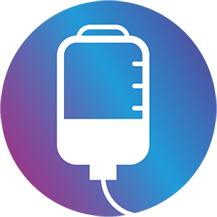

A clinical trial for patients with HR+/HER2− Stage 3 or 4 breast cancer
Thank you for your interest in participating in this clinical research. People from all around the world contribute to advances in breast cancer research by giving one of their most precious resources: time.

WHAT IS VIKTORIA-2?
VIKTORIA-2 is a clinical trial for people who have HR-positive/HER2-negative (HR+/HER2−) Stage 3 or 4 breast cancer. The goal of this trial is to evaluate whether addition of a new investigational drug, called gedatolisib, to standard anticancer care is safe and effective for people with this form of cancer.
In this trial, one group of patients will receive gedatolisib combined with two anticancer drugs (fulvestrant and either Ibrance or Kisqali), while another group will receive the two anticancer drugs (fulvestrant combined with either Ibrance or Kisqali without the addition of gedatolisib.
WHAT ARE CLINICAL TRIALS?
Before any drug is approved for use, clinical trials (also called clinical studies) must show that it is safe and that the drug provides benefit to people using it. Clinical trials enroll volunteer participants, who may get access to investigational drugs before they are made available to the general population.
When you enroll in a clinical trial, you become part of a trial team of medical experts, researchers, and site staff. Your participation may contribute to advances in treatment for future patients.
Your safety and well-being will be the top priorities of the trial team. Before enrolling, you will receive full details of what participation in the clinical trial will require, and members of the trial team will explain the potential risks and benefits of participating. No tests or assessments will take place until you have given your informed consent.
Taking part is voluntary. If you choose not to participate, this will not affect any future treatments that you may need.
WHERE DO CLINICAL TRIALS TAKE PLACE?
Clinical trials take place at hospitals, clinics, and private doctors’ offices. These are often referred to as trial sites or trial centers. The trial site might be your own doctor’s office. Alternatively, you might continue to work with your own current healthcare team but receive trial treatment at a new hospital or clinic, where you would meet the trial doctor and trial team.

ABOUT GEDATLOISIB, THE VIKTORIA-2 INVESTIGATIONAL DRUG
The investigational drug in VIKTORIA-2 is called gedatolisib. It is given intravenously (which means into a vein). Gedatolisib is designed to work differently from current treatments for patients with HR+/HER2− Stage 3 or 4 breast cancer. It blocks the activity of a pathway inside the cell known as PI3K/AKT/mTOR. This cellular pathway helps regulate the growth and function of cells in the body. In many different tumors, this pathway becomes very active, which can lead to rapid increases in the number of cancer cells. The VIKTORIA-2 trial will help determine whether blocking the activity of the PI3K/AKT/mTOR pathway when gedatolisib is combined with other therapies can cause breast cancer tumors to stop growing or shrink. Gedatolisib is not approved by regulatory authorities in any country for doctors to prescribe and is considered experimental. However, permission has been granted for people to receive it in various clinical trials, including VIKTORIA-2.
WHAT DOES VIKTORIA-2 PARTICIPATION INVOLVE?
If you are enrolled into the VIKTORIA-2 trial, you will receive trial treatment in 28-day cycles. Each cycle will include:
- Kisqali or Ibrance as oral tablets (21 days on, 7 days off per cycle).
- Fulvestrant by injection into a muscle (usually once per cycle).
- + Gedatolisib (only if you are assigned to receive it) by intravenous infusion (three times per cycle).
You may be able to continue the trial treatment cycles until the end of VIKTORIA-2. After you finish trial treatment, the trial team will follow up with you regularly to check on your health status (approximately every 6 months). This follow-up will continue for approximately 4 years, or until the trial closes.
WHAT IF I WANT TO STOP TRIAL TREATMENT?
You can stop trial treatment at any time, for any reason. In some cases, you may need to stop trial treatment due to a change in your health. That is a decision typically made together with your trial doctor and the trial team.
CAN I JOIN?
There are many specifications that you must meet to be able to join the trial. This is to ensure that the trial is the right fit for you. You may be able to join if you:

Are at least
18 years of age.

Have been diagnosed with HR+/HER2− Stage 3 or 4 breast cancer.

Have not previously received whole-body therapy (e.g. chemotherapy) for Stage 3 or 4 breast cancer.
If you meet these criteria and want to find out more about the trial, contact your local trial site or find a trial site participating in VIKTORIA-2.
RESOURCES FOR YOU
The following resources may be helpful for understanding your own health, and what it is like to take part in a clinical trial.
RESOURCES FOR YOUR SUPPORT NETWORK
Here are some resources for family, friends, and caregivers who may have questions about your diagnosis.